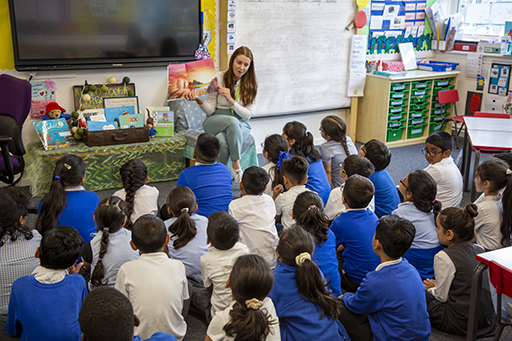7 Beyond attainment: the transformational power of Reading for Pleasure
Traditionally reading has been defined simply as the capability to decode an alphabetic script. However, recognising that the ways in which people engage with literacy are changing, the Organisation for Economic Co-operation and Development’s (OECD) Programme for International Student Assessment (PISA) developed a more expansive definition of reading.
It can be summarised as understanding, using, evaluating, reflecting on and engaging with texts in order to achieve one’s goals, to develop one’s knowledge and potential, and to participate in society.

Throughout this course this wider understanding of reading will be used; this will enable you to focus on what reading does for the individual child, and how Reading for Pleasure, that is choosing to read, potentially enhances their relationships with others and with their communities.
SAQ _unit2.7.1 Personal reflection 3
Think about the different text types you have engaged with in the last 24 hours. Why did you read them? Make a note of some texts that enabled you to:
- achieve a goal
- develop your knowledge
- participate in some kind of social interaction.
Comment
Your reflections might highlight how much reading you do for your own purposes each day. Some examples of reading to achieve a goal might include reading a recipe or a set of instructions. Reading this online course is an example of developing your knowledge, equally reading a magazine or a novel can enhance your knowledge and understanding about particular issues. You may have been involved in a social media thread, or a WhatsApp chat, building relationships and your networks.

Reading a variety of different text types, and particularly different narratives (such as fiction, picture storybooks, biographies or historical novels) and poetry, is a powerful tool to develop your imagination, enhance your social and emotional understanding, develop your capacity for empathy and broaden your perspectives of the world. Literature has the power to transform – it holds the potential to promote positive mental health, and has a myriad of personal, social and emotional benefits, for children as well as adults.
A study by the National Literacy Trust (NLT) found that:
Children and young people who enjoy reading very much and who think positively about reading have, on average, higher mental wellbeing scores than their peers who don’t enjoy reading at all and who hold negative attitudes towards reading.
The NLT study also revealed that while the relationship between reading and wellbeing is not fully understood, it may be connected with the many social and emotional benefits of reading. These include:
- Reading offers hope: In many children’s books, characters face and overcome adversity. That doesn’t mean every story has a ‘happily ever after’ ending, but such narratives help children to cope with loss and change; they convey the message that feelings of sadness or despair are transient and will not remain forever.
- Reading offers insight and understanding: By becoming immersed in a narrative and relating to characters, children develop understandings of complex social relationships from a safe, onlooker perspective. Reading helps children understand emotions and situations they themselves might face, such as bullying or confrontational situations and thus helps them navigate the social world.
- Reading offers escapism: It fosters the imagination, enabling children to see other worlds in their mind’s eye. They might imagine they are the one who just stepped through the wardrobe into Narnia to take up the role of hero/heroine to emancipate the oppressed. Reading invites us to think beyond what is familiar and beyond the here-and-now, to imagine alternative possibilities.
- Reading offers comfort and connection: Adult–child shared book reading enables children to engage with literature that is beyond their current reading level. Furthermore, this precious time, often snuggled up together, offers a sense of comfort, belonging, love and reassurance.
Thus, reading is a social and emotional investment, with the potential for invaluable returns. Furthermore, through reading you connect with characters and experience the world (feeling and sensing it) from their perspective. When viewing reading in this light, the ‘affective’ nature of reading become clear.
